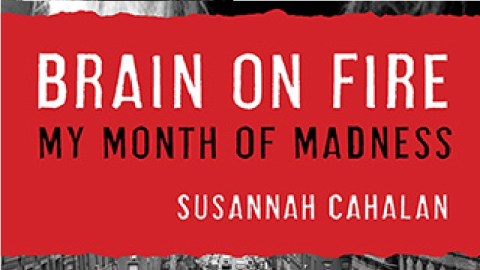Brain on Fire: A Q&A with Susannah Cahalan

Susannah Cahalan was just another ambitious New York kind of girl–a fast-rising cub reporter at the New York Post and fabulous gal about town–when something surprising happened. She lost her mind.
In her new book, BRAIN ON FIRE: MY MONTH OF MADNESS, Cahalan takes on a Herculean task that most journalists would not even think of trying — she uses her reporting skills to chronicle a month of her life that she does not remember, a month where she changed physically, mentally and emotionally due to a rare brain disease. Here, Cahalan talks about the emotional aspects of reporting on your own medical case, what’s missing from the current treatment of brain disorders and how her health is today.
Q: This book was an incredible undertaking. What inspired you to write your journey as a book?
Cahalan: My initial muse was really unromantic – it was the threat of making a deadline. My editor had heard about what happened to me through a colleague and assigned me less than a week to write about my experience. It was a nutty mission but it quenched my thirst to research and write more, and I thought the natural outgrowth of that would be in book form. It was only after my article was published that a real purpose emerged. I received hundreds of emails from people all over the world, telling me about their own stories and sharing their own hardships, and I realized that it was not only important for me (as a cathartic exercise) to write it, it was even more important for me to share it with as wide an audience as possible to get the word out about the disease and to give some support to those suffering from undiagnosed diseases.
Q: How difficult was it to delve into your own medical history?
Cahalan: My own medical history during my hospital stay was readily available to me through literally thousands of pages of medical records that outlined everything from my “bowel releasing” schedule to the minute details of my brain biopsy procedure. Other aspects, say of a visit that I took to a psychiatrist before my hospital stay, had to be tracked down with a little more elbow grease, which required a little use of my tabloid reporting skills that I learned at the New York Post. The hardest part, by far, however, had to do with what happened after the hospital, when medical records became less necessary and as I continued on in my recovery. That had less paperwork and more emotional elements to it, making it harder to write and report out.
Q: What did you learn about medicine and the brain? What surprised you the most?
Cahalan: Since I started at zero, only a basic understand of the body from high school biology and a few evolution classes at college, I learned a tremendous amount. There were so many surprising facts down this road that impressed me, which a more seasoned science practitioner would probably role her eyes at, but my most surprising finding was probably how little we really know about it all. I’d ask experts questions, straightforward cause and effect ones that I’d assume was obvious or dumb—and as I’d brace myself to be belittled—the expert would say, “We have no idea.” At first it was frustrating and then a bit disconcerting. But now I realize it’s exciting. The brain is the black box; the final frontier. We are only in the beginning stages of understanding how the brain and body works together and there’s so much left to figure out.
Q: What is missing from treating people with obvious brain disorders?
Cahalan: For me, I think that there’s a lot missing from the recovery or the post-diagnosis side of treating patients. Once the diagnosis is made, I feel that care drops off tremendously, even though it is precisely the time that a patient needs help the most, even if they are not verbalizing it. For me, recovery was the loneliest, most difficult part of it all and I feel we should be devoting a good deal of our efforts to helping people adjust to a new life with a different brain.
Q: Are you healthy now?
Cahalan: Yes, I believe I am healthy now. People ask me all the time if I’m back to 100% and I want to say yes, but I’ve found through this project that I’m not the best judge of my own condition. I believed I was 100% when I was far from it. Maybe that’s because I’m pigheaded, but I think we all have a blind spot that makes judging ourselves objectively really impossible. But that might be beside the point, if you did the blood work, the PET scans, and the MRIs (because I have had them done recently), yes, I would be healthy now.
Q: What do you hope that people take away from the book?
Cahalan: Be your own advocate. And if you can’t do it for yourself, make sure you have someone, family or a friend, who can do it for you. Get a second opinion from a different institution. On an entirely different note, I hope that readers walk away holding their loved ones a little tighter and feeling a sense of awe and respect for the incredible way our bodies can work and how devastating it can be when they fail.





